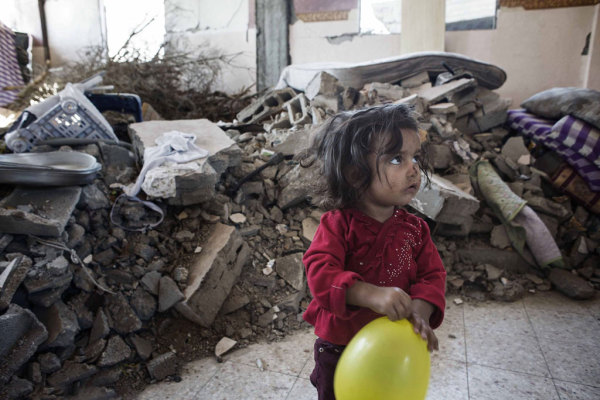Never in recent memory have so many children been subjected to such unspeakable brutality, the UN Children’s Fund (UNICEF) on 8 December 2014 said, as 2014 has been “devastating” for some 15 million children caught up in violent conflicts around the world.
“This has been a devastating year for millions of children,” said Anthony Lake, UNICEF Executive Director, in a press release issued by his organization.*
“Children have been killed while studying in the classroom and while sleeping in their beds; they have been orphaned, kidnapped, tortured, recruited, raped and even sold as slaves,” Lake said. “Never in recent memory have so many children been subjected to such unspeakable brutality.”
As many as 15 million children are caught up in violent conflicts in the Central African Republic, Iraq, South Sudan, Syria, Ukraine and in the Occupied Palestinian territories – including those displaced in their own countries or living as refugees outside their homeland, according to UNICEF.
And an estimated 230 million children live in countries and areas affected by armed conflicts, it said.
Yet, UNICEF said: “The sheer number of crises in 2014 meant that many were quickly forgotten or captured little attention.”
“Protracted crises in countries like Afghanistan, the Democratic Republic of the Congo, Nigeria, Pakistan, Somalia, Sudan and Yemen, continued to claim even more young lives and futures,“ it said.
The children’s agency went on to say that 2014 has also posed significant new threats to children’s health and well-being, most notably the Ebola outbreak in West Africa, which has left thousands of children orphaned and an estimated 5 million out of school.
“Violence and trauma do more than harm individual children – they undermine the strength of societies,” said Mr. Lake. “The world can and must do more to make 2015 a much better year for every child.”
Kidnapped, Recruited, Used by Armed Forces, Attacked on Education, Health…
In 2014, UNICEF said children have been kidnapped from their schools or on their way to school, recruited or used by armed forces and groups. It also noted a rise in attacks on education and health facilities and use of schools for military purposes:
- In the Central African Republic, 2.3 million children are affected by the conflict, up to 10,000 children are believed to have been recruited by armed groups, and more than 430 children have been killed and maimed – three times as many as in 2013;
- In Gaza, 54,000 children were left homeless as a result of the 50-day conflict during the summer that also saw 538 children killed, and more than 3,370 injured;
- In Syria, with more than 7.3 million children affected by the conflict including 1.7 million child refugees, the United Nations verified at least 35 attacks on schools in the first nine months of the year, which killed 105 children and injured nearly 300 others.;
- In Iraq, where an estimated 2.7 million children are affected by conflict, at least 700 children are believed to have been maimed, killed or even executed this year;
- And in South Sudan, an estimated 235,000 children under five are suffering from severe acute malnutrition. Almost 750,000 children have been displaced and more than 320,000 are living as refugees.
Life-saving Assistance
UNICEF said it and its partners have worked together to provide life-saving assistance and other critical services like education and emotional support to help children growing up in some of the most dangerous places in the world.
- In Central African Republic, a campaign is under way to get 662,000 children back to school as the security situation permits.
- Nearly 68 million doses of the oral polio vaccine were delivered to countries in the Middle East to stem a polio outbreak in Iraq and Syria.
- In South Sudan, more than 70,000 children were treated for severe malnutrition.
- In Ebola-hit countries, work continues to combat the virus through support for community care centres and Ebola treatment Units.
*Source: UN news report).
Read also:
Children Born in Exile — The Challenge of Life in Their Afghan Homeland
Is the World a Better Place for Children?
“Children are the fundamental building block for achieving the future we want”
Complications of Premature Birth, World’s Number One Killer of Young Children
Can Innovation Drive Change for Most Disadvantaged Children?
Children Born in Exile — The Challenge of Life in Their Afghan Homeland
How Does a Ball Help Change the Lives of Children?
Mobile Training Van Makes a Difference to Street Children in Thailand
Migrant Detention “Abuse” Can Scar Children for Life
Indiscriminate, Brutal Killings Children in Conflict
No ‘Back to School’ for 30 Millions of Children Affected by Conflict, Crisis – UN
Violence against Children Is Universal, Deeply Ingrained in Societies, Often Accepted as the Norm
Hidden in Plain Sight — New Global Data Expose “Acute Prevalence” of Violence against Children
2014 Human Wrongs Watch












